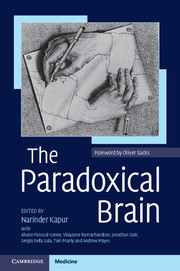Book contents
- Frontmatter
- Contents
- Acknowledgements
- Preface
- Foreword
- Author affiliations
- Abbreviations
- 1 The paradoxical nature of nature
- 2 Paradoxical effects of sensory loss
- 3 Paradoxical functional facilitation and recovery in neurological and psychiatric conditions
- 4 Paradoxes in neurorehabilitation
- 5 The paradoxical self
- 6 Paradoxical psychological functioning in early child development
- 7 Cognitive ageing: a positive perspective
- 8 Paradoxes of learning and memory
- 9 The paradox of human expertise: why experts get it wrong
- 10 Paradoxes in Parkinson's disease and other movement disorders
- 11 Paradoxical phenomena in epilepsy
- 12 Paradoxical creativity and adjustment in neurological conditions
- 13 Paradoxical functional facilitation with noninvasive brain stimulation
- 14 Unexpected benefits of allergies and cigarette smoking: two examples of paradox in neuroepidemiology
- 15 The paradox of autism: why does disability sometimes give rise to talent?
- 16 Paradoxes in creativity and psychiatric conditions
- 17 The paradox of psychosurgery to treat mental disorders
- 18 The paradox of electroconvulsive therapy
- 19 Paradoxes of comparative cognition
- 20 Paradoxical phenomena in brain plasticity
- 21 Immature neurons in the adult brain. Breaking all the rules
- 22 The paradoxical hippocampus: when forgetting helps learning
- 23 Paradoxical effects of drugs on cognitive function: the neuropsychopharmacology of the dopamine and other neurotransmitter systems
- 24 The paradoxical brain – so what?
- Index
- References
23 - Paradoxical effects of drugs on cognitive function: the neuropsychopharmacology of the dopamine and other neurotransmitter systems
Published online by Cambridge University Press: 05 December 2011
- Frontmatter
- Contents
- Acknowledgements
- Preface
- Foreword
- Author affiliations
- Abbreviations
- 1 The paradoxical nature of nature
- 2 Paradoxical effects of sensory loss
- 3 Paradoxical functional facilitation and recovery in neurological and psychiatric conditions
- 4 Paradoxes in neurorehabilitation
- 5 The paradoxical self
- 6 Paradoxical psychological functioning in early child development
- 7 Cognitive ageing: a positive perspective
- 8 Paradoxes of learning and memory
- 9 The paradox of human expertise: why experts get it wrong
- 10 Paradoxes in Parkinson's disease and other movement disorders
- 11 Paradoxical phenomena in epilepsy
- 12 Paradoxical creativity and adjustment in neurological conditions
- 13 Paradoxical functional facilitation with noninvasive brain stimulation
- 14 Unexpected benefits of allergies and cigarette smoking: two examples of paradox in neuroepidemiology
- 15 The paradox of autism: why does disability sometimes give rise to talent?
- 16 Paradoxes in creativity and psychiatric conditions
- 17 The paradox of psychosurgery to treat mental disorders
- 18 The paradox of electroconvulsive therapy
- 19 Paradoxes of comparative cognition
- 20 Paradoxical phenomena in brain plasticity
- 21 Immature neurons in the adult brain. Breaking all the rules
- 22 The paradoxical hippocampus: when forgetting helps learning
- 23 Paradoxical effects of drugs on cognitive function: the neuropsychopharmacology of the dopamine and other neurotransmitter systems
- 24 The paradoxical brain – so what?
- Index
- References
Summary
Summary
Neurotransmitters are the means by which one neuron influences the action of another. Abnormalities in neurotransmitter function are implicated in a variety of neurological and neuropsychiatric disorders and drugs that influence the neurotransmitter systems are often used in treating the symptoms of such disorders. The effects of these drugs can be paradoxical. A small dose of a pharmacological agent might have entirely the opposite effect to a large dose, a drug may improve one ability whilst impairing another, a drug may have opposite effects in different populations or opposite effects in the same individual at different times. In this chapter, we illustrate these effects using clinical data and data from healthy volunteers in experimental studies. With one of the best studied neuromodulators – dopamine – as our focus, we introduce key principles that can help to explain these apparent paradoxes. First, the effect of a drug depends on baseline levels of the neurotransmitter already in the system. When baseline levels are low, a given pharmacological dose can increase function closer to an optimal level. When baseline levels are high, the same dose can over-stimulate the system and trigger compensatory mechanisms that reduce performance on a given task. Second, a drug could have quite different effects in different brain regions. Accordingly, a function that is predominantly influenced by one region may be enhanced, whilst another function, more dependent on another region, may be impaired. In the final section of the chapter, we turn to attention deficit hyperactivity disorder (ADHD).
- Type
- Chapter
- Information
- The Paradoxical Brain , pp. 397 - 417Publisher: Cambridge University PressPrint publication year: 2011
References
- 2
- Cited by

